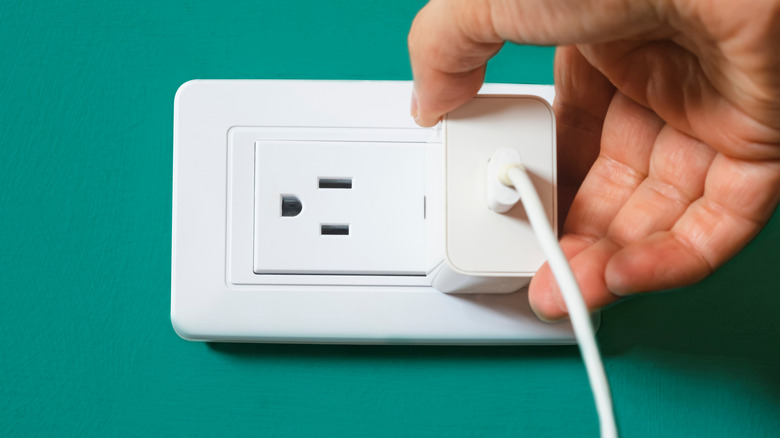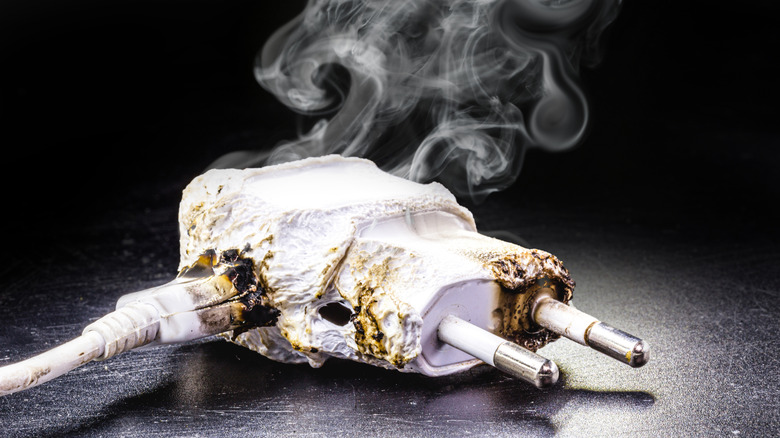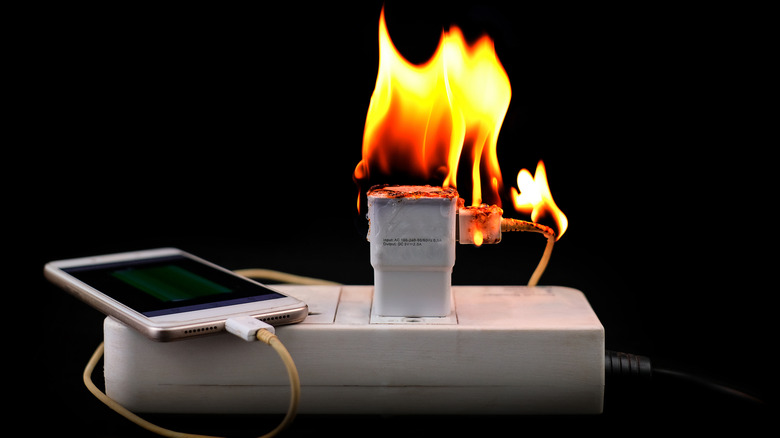Is It Normal For A Phone Charger To Get Hot?
If you've ever left your phone to charge for a while, then noticed the charging brick warming up, it's natural to be alarmed. In the world of tech, heat can often spell trouble. It can indicate a critical failure that could lead to a broken device in some cases, or even a fire in the most extreme instances. At the same time, all electronics generate a bit of heat, which is why so much engineering power is spent figuring out new ways to cool a PC, stop smartphones from overheating, and so on. It can be difficult to determine when your gadgets have reached a level of overheating that justifies concern.
When it comes to drawing power to charge a device, a bit of heat is inevitable. As electrons are carried from the power source, be it a type of electrical plug or a portable power bank, some energy is lost and escapes into the surrounding environment as heat. It's as true of mobile device chargers as it is of enormous data centers. However, you don't need to worry in most instances. As long as you're using a high quality charger that's suited to your phone, and you're drawing power from a trustworthy source, a bit of warmth from the charger is normal. Even so, it's important to be aware when things cross the line into danger. Here's what you need to know.
A warm charger is normal but a hot one isn't
When charging a device, be it a smartphone, laptop, or anything else, it's completely normal for the charging brick to warm up a bit. Especially if your phone includes convenient features like fast charging — and is paired with the fastest charger for your phone — you're likely to feel a bit of heat coming from both the charger and the phone itself. There are some things you can do to mitigate the warmth if it worries you. For example, some light overheating is likely if you leave your phone plugged in after the battery has fully charged, so it's a good idea to unplug once it hits 100%. It's always a good idea to be conscious of your battery health and follow tips to stop your phone from overheating. In general, though, mild warmth from the charger is not anything to worry about.
However, you should be concerned if you notice the charger is not merely warm, but hot. If the charging brick is becoming uncomfortable to touch, and especially if it's painful, you should unplug it immediately from the power source and disconnect any charging cables. Such intense heat indicates a critical problem with either the charger itself, the power source, or in some cases the device being charged.
Runaway heat can easily lead to a meltdown or a fire, and in either scenario the charger may begin to off-gas toxic chemicals in the form of smoke. If you notice any smoke or strange smells while unplugging a hot charger, leave the area immediately and contact the relevant emergency services for your location. Whatever you do, don't drop the charger in water, as this can make things a lot worse.
Why your phone charger could be overheating
If you notice that your smartphone's charging brick is concerningly hot, you should unplug it in a safe manner and cease to use it. However, once you've ensured the situation is safe, it's important to understand why your phone charger could be overheating. There are a number of causes for overheating chargers, which can damage both your phone and your charger.
Sometimes, chargers simply break internally, or degrade with frequent use. This is especially likely to happen if you're using a generic, "white labeled" charger of the kind often sold at suspiciously cheap prices on Amazon, or in the bargain bin of your local drugstore. These chargers may lack safety features, such as power delivery technology that smartly communicates with your phone to charge it at a healthy rate. Such chargers are often sold without a recognizable brand name.
Charger overheating can also be caused by a charging cable that isn't working due to damage. This can mean you're literally getting your wires crossed in some cases, causing extra electrical resistance or interference. Your charger may not receive proper power delivery instructions from your phone, or the charger might work extra hard to push past the increased resistance. In either case, overheating can occur, as well as damage to your phone. Lastly, charging your phone in a hot environment, such as in direct sunlight or in an unventilated room, can cause your charger or phone to overheat in a process known as thermal runaway. Whatever the cause of your overheating charger, the important thing is to stop using it right away when you notice excessive heat.


